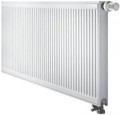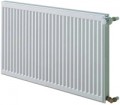Connection
How to connect a radiator to a heating system. It is indicated by the location of the inlets for connecting the supply and return.
In modern radiators, both
side and
bottom connections are found. In the latter case, the inlet and outlet pipes can be located both on the sides (on different sides of the structure) and in the centre, side-by-side. Anyway, this feature does not affect the functionality and specs of the radiator. At the same time, it must be borne in mind that the sideward connection can involve both one-sided and dual-sided (from different sides) pipe connection; many models allow both options at once, to choose from, but this point needs to be specified separately.
Note that the available connection methods depend to some extent on the type of radiator (see above). For example, panel devices can have any type of connection, and in sectional products, the sideward method is mainly used — other options are extremely rare, mainly in models of a specific design.
Pipe centre distance
The distance between the axes of the inlet and outlet manifolds of the radiator or its separate section.
The dimensions of the product and the possibility of installing the heater in specific conditions, taking into account the peculiarities of the pipe connection, directly depend on this parameter. The parameter is indicated mainly for models of traditional design - with two horizontal pipes at the top and bottom, between which vertical channels of the heat transfer are laid.
The centre distance determines at least the overall height of the product, and in radiators with sideward connection (see the corresponding paragraph), it also determines the features of the organization of this connection.
As for specific values, the most common models in our time are
250 mm,
350 mm,
450 mm,
550 mm and
850 mm. Solutions for
150 mm,
400 mm,
500 mm and
700 mm are noticeably less common.
Connection size
The diameter of the thread used to connect the radiator to the heating system. Modern radiators use standard sizes — for example,
3/4" or
1/2", less often
1" and
1 1/4". This indicator must match the dimensions of the pipes, couplings and other elements directly used for connection — otherwise, at best, you will need to install adapters, and at worst, the radiator will turn out to be unusable at all.
Usually, the larger the thread diameter, the more powerful the radiator (high power requires intensive circulation of the heating medium and an appropriate throughput at the inlet and outlet).

